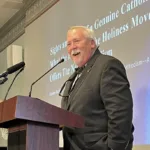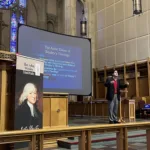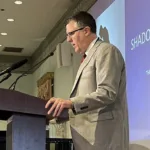
By Aaron Gaglia (@GagliaAC)
On Tuesday night, hundreds gathered at New York Avenue Presbyterian Church in Washington, D.C. to commemorate the 10-year anniversary of the Iraq War.
Shane Claiborne, Greg Barrett, author of The Gospel of Rutba, and Jeremy Courtney, CEO of Preemptive Love Coalition, discussed the beautiful possibility of wartime friendships in an event entitled, “Subversive Interfaith Friendships in a World at War.”
Towards the beginning of the event, these statistics appeared on the screen: “Estimates on the number of war-related deaths during the invasion range between 600,000 to one million. It also is estimated that over 7,000 of those were civilians killed in the initial ‘shock and awe’ bombing that happened on this day in 2003.” This event sought to put a civilian face to these statistics and tell a hopeful story despite these tragedies.
The conversation focused on an Iraqi-American’s retelling of the Good Samaritan story, which Greg Barrett chronicles in his book, The Gospel of Rutba. Shane Claiborne and others were in Bagdhad befriending and living life among ordinary Iraqi’s as the war was starting. After a few months, Shane and a few others were leaving the country, driving through the desert to Amman, Jordan. This normally treacherous journey was intensified by the bombings, as bridges were down and cars were on fire. Along the way, the taxi hit something on the road that popped a tire, causing the car to flip into a ditch. Everyone in the taxi was hurt, with two of them sustaining bad head injuries.
Everyone climbed out of the car and made their way to the side of the road, not knowing what they were going to do since very few people were on the roads due to the bombings. Yet eventually an Iraqi in a small car drove by and stopped. He saw their situation and took them into his car and drove them to the closest town, Rutba. The people of Rutba were very helpful and connected them with the town doctor right away. Sadly, they could not take them to the town hospital because it was hit by a bomb (a secondary explosion from another building hit the children’s ward). Instead they took them to a shanty ward they set up. Everyone was treated and ended up being okay. They all received incredible hospitality in the rural town of Rutba.
After everyone was treated and cared for, Claiborne gathered money and tried to pay the manager of the hospital. He would not accept. Instead he told Shane, “All that we want you to know is that we love you. And if you tell people what we did for you in Rutba, it’s all we would ever want you to do to repay us.”
Greg Barrett, a newspaper correspondent at the time, also told a story about his first visit to Iraq in 2003. He went to investigate the “nuts for Christ” who were trying to make peace amidst the war. He was expecting to receive great hostility from the Iraqis. Instead, his first encounter with an Iraqi, was a man alerting him that his bag was unzipped and his money was exposed. This was not the enemy he was expecting to meet. Instead of hostility, he was greeted with hospitality. A normal citizen of Iraq is not a hateful monster but a normal human just like me and you.
Though the event focused almost exclusively on civilian friendships and did not explore terrorism, Jeremy Courtney conceded that the situation in Iraq is “complex.” He admitted that some of the Iraqis showed hospitality because they were grateful to America for removing Saddam Hussein from power.
Courtney spoke about the work he is doing in Iraq with his non-profit, Preemptive Love Coalition, “a five-year old international charity that has provided more than 300 heart surgeries to a backlog of Iraqi children suffering from birth defects, problems that come from the munitions that are used in the war” (from event handout). Through these acts of love, Courtney is seeking to bring a better peace than what war is bringing.
Hearing about the work of Courtney, Claiborne, and Barrett was truly inspiring. This event was a good reminder to get past the heated war/pacifism debate and remember that terrorists are not the only ones that are affected by war: innocent civilians are affected as well. 7,000 dead civilians in one day is something that is tragic and unacceptable whether you think war is necessary or not. As Christians who believe war is necessary, we must be careful to make sure our views are not consequentialist by nature.
We must be mindful in our belief and practice of war. The killing of innocent civilians in a bombing is not justified, and we must do everything in our power to stop it. We must protect the innocent both in our country and in the countries we are in conflict with even if it makes the war more difficult. It must be acknowledged, though, that are military is continually developing and using new technology to lower civilian casualties, such as guided missiles. Though one may disagree with certain actions of the U.S. military, these more accurate technologies, coupled with policies to protect the rights of enemies, show that they are making attempts to wage a more humane war.
As Christians, we need to engage in honest dialogue with those with whom we disagree. We cannot intensify our view or discredit valid points simply because of the volatility of party relations. We cannot simply dismiss pacifist pleas to not kill innocent civilians as naïve distractions. Instead, we must have the personal integrity to engage in meaningful conversation that is willing to find common ground and correct wrong thinking.
Though we disagree about the necessity of war in this fallen world, we can stand united in our valuing of human life and our longing for a world without war.
As this is a very complex and heated issue, please be kind and respectful in your comments.
Did you like this article? Visit IRD’s website to learn more about our programs and how you can support our work!




Comment by Michael Snow on March 21, 2013 at 11:49 am
We ought to also remember that leading Evangelical voices supported the invasion, some looking at it as a missionary opportunity. Spurgeon puts this into perspective (see links here to evangelcal statements on the war)
http://spurgeonwarquotes.wordpress.com/
Comment by Daryl Densford on March 21, 2013 at 2:22 pm
Aside from a few nuts who have been brought to trial, all of the American military would agree that innocent civilians are not a target and seek to minimize civilian casualties. Unfortunately, collateral damage occurs regardless of how careful we are.